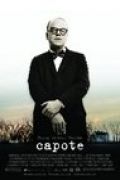
Directed by
Bennett Miller
110 minutes
Rated M
Reviewed by
Bernard Hemingway


Capote
Synopsis: Truman Capote (Philip Seymour Hoffman), who has an established reputation as a writer of light fiction (most famously, 'Breakfast At Tiffany's'), decides to investigate four brutal Kansas murders as a possible subject for an article in the New Yorker magazine. It is a decision that will irrevocably change his life.One gets the impression from the title of this film that it is a biopic. Strictly speaking it is not that but rather an account of Capote during the period in which he wrote his now best known book, 'In Cold Blood', a work that both made him one of America’s best-known authors and effectively ended his output as a creative artist (he died in 1984 from complications from drug and alcohol abuse). We do get some quite restrained intimations of his life as a member of the New York literati of the late 1950s and early '60s, including his platonic relationship with Nelle Harper Lee, winningly played by Catherine Keener, a friend who served as a kind of PA-cum-research assistant to him before she became famous in her own right as the author of 'To Kill A Mockingbird'.
With the facts of the actual murder kept in the background for most of the film the spotlight is on Capote and his oddly intense involvement with one of the killers, Perry Smith (Clifton Collins Jr.). Clearly Philip Seymour Hoffman has closely studied video and audio records of the author and from the opening scene in which we first encounter Capote at a Manhattan party we are impressed by the way in which Hoffman, who has an executive producer credit for this film, has so convincingly captured the writer’s well-known vocal and gestural mannerisms. Hoffman was impressive in Owning Mahowny (2003), indeed he stands out in all his films but here he moves onto a completely different level of characterisation, one which takes him well beyond his comfort zone and up to an undoubted career high (it won him a Best Actor Oscar). Unlike Jamie Foxx in Ray, who had dark glasses and some very broad mannerisms to help him pull off a polished imitation of Ray Charles, Hoffman must suffer the camera’s scrutiny as he portrays a man in conflict with himself beneath a veneer of insouciance. The result is brilliant.
In this respect the screenplay by Dan Futterman, based on a book by Gerald Clarke, quietly brings home the transformation in Capote’s character during the five years he worked on the book, a task which took him from choosing what he thought was going to be a clever career move to effectively acting as the murderer’s champion and descending into his own private hell as he struggled to keep his identity separate from his subject. The suggestion is, and one assumes this is based on some kind of evidence, that Capote identified with the dysfunctional Smith and that his sympathies were exacerbated by a homosexual attraction to the killer, a double whammy that pulled him into a psychological vortex from which he was effectively unable to extract himself. There is no emotional grandstanding here but rather as the case goes through various appeals Capote retreats into himself, the book he is writing and the bottle, the film only pulling us out of his slough of despond with the brief recreation of the killings and the hanging of Smith. The result is a slow-paced and quite sombre film but a compelling one.
FYI: For those interested, Capote's book was well-filmed as In Cold Blood, by Richard Brooks in 1967 with Robert Blake in the role of Perry Smith. A second Capote biopic, Infamous, with Toby Jones playing the author came out a year after Miller's film. ..
Want something different?





